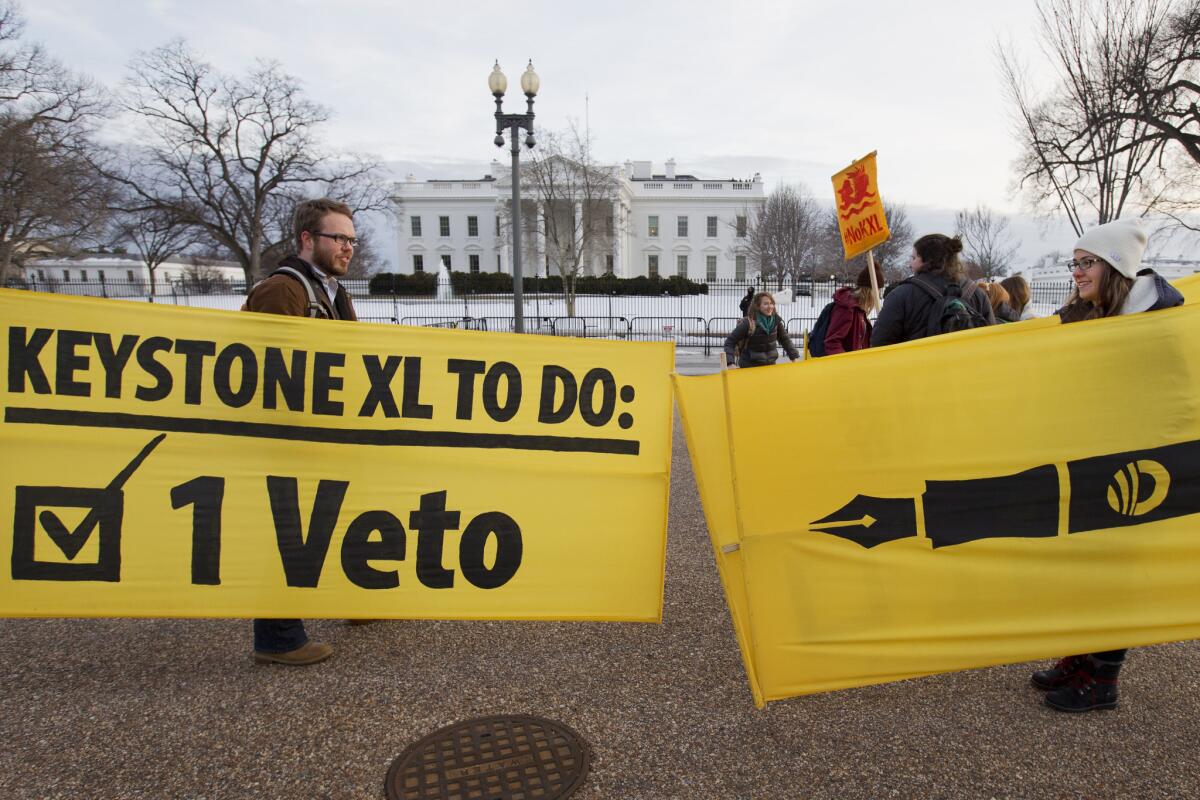Opinion: The Keystone XL veto: first of many, or the only one necessary?

- Share via
Non-news flash: President Obama vetoed the bill Tuesday that would have forced the administration to approve construction of the Keystone XL pipeline from eastern Alberta to the southern edge of Nebraska.
Now that this little exercise in Kabuki theater is behind us, the question is whether the Republican Congress and the Democratic White House simply needed to get this one out of their system, or if they truly can’t figure out how to govern together.
Full disclosure: The Times’ editorial board has expressed qualms about the potential for leaks, although we haven’t called for the project to be rejected (or approved). As for me, although I consider the arguments by proponents weak (especially the one about jobs created, the vast majority of which will just be temporary gigs for construction workers), I’m even less impressed by the arguments by opponents (let’s face it, Canada is going to extract oil from the tar sands with or without a pipeline).
Let’s ignore the merits of the pipeline project for a minute and consider what’s been going on here.
The Obama administration moved as slowly on the permit application as humanly possible, which goaded supporters of the pipeline -- most but not all of whom are Republican -- to try to give Keystone XL the green light legislatively. That triggered a fight over the process and executive decision-making, and Obama would have been a fool not to defend, tooth and nail, the administration’s prerogatives. To do otherwise would be to concede that the pipeline decision was a political one, not an evidence-driven one best left to expert government agencies.
(I know, the slow-rolling by the administration arguably politicized the process long before Congress could. But the proof will be in what the administration ultimately concludes, and we haven’t reached that point. It could still approve the project, as The Times’ Doyle McManus has observed.)
Anyway, the steps so far have been formulaic and pre-ordained. As soon as they took control of the gavel in the Senate, Republicans saw a clear path to passing a Keystone XL bill. Obama, in turn, signaled that he would veto such a bill if it reached his desk. Republicans did their part, Obama did his.
Considering the landscape, you might think one side or the other would have gone into Deal-making Mode, which would have involved finding a way to pair a Keystone XL permit with something congressional Democrats and Obama badly wanted. That’s how deals typically are struck.
But this being the first big face-off between Obama and Republicans newly in control of both chambers, both sides probably wanted to test the other’s mettle before conceding anything. The fact that Senate Republicans allowed Democrats to offer some amendments to the bill was a sign of progress, but it’s hardly a concession when all of the proposed changes get tabled or defeated outright.
Which brings us back to the question posed above. We’re currently embroiled in a second stare down, this time over the Department of Homeland Security funding bill. And as with the Keystone XL case, this one doesn’t look like it’s going to be resolved with a compromise that gives both sides something they want. Instead, Senate Republicans appear to be conceding defeat, splitting the disputed immigration riders from the provisions funding the department through the end of the fiscal year on Sept. 30. The riders are expected to be voted on separately, and it’s not at all clear that Republicans can overcome a Democratic filibuster.
There are lawmakers who wouldn’t want to compromise under any circumstances. But others see trade-offs as a way to get more, not less, of what they want on Issue X in exchange for giving the other side something it wants on Issue Y. The key is in finding the right sweeteners.
For Keystone XL, that probably means giving Democrats something they want on energy policy (e.g., more money for clean-energy subsidies) or environmental protection (e.g., dropping opposition to the Environmental Protection Agency’s carbon-emission standards for new power plants).
It’s hard to imagine such trade-offs happening, though, until something changes in the political environment. The voters haven’t penalized either Obama or congressional Republicans for butting heads for the past four years. Now, Obama has no more elections to win or lose, and Republicans may believe (rationally) that voters will reward them again for not cooperating with an unpopular president.
Ordinarily, I’d say that’s a recipe for more of the same. But both Senate Majority Leader Mitch McConnell (R-Ky.) and House Speaker John A. Boehner (R-Ohio) have said they want to use the majorities they have to move the ball, not just watch it spin.
If they’re serious about that, then they have to remind their colleagues that compromise isn’t just about a voting more amendments down or finding some Democrats from swing districts to sign on to your bills. It’s about understanding why the other side doesn’t like what you’re proposing and, rather than defying them to stop you, giving them something to ease their pain.
Nor has the administration been pitching deals that offer some sugar to the GOP, at least not so that anyone would notice. With the exception of his unsuccessful efforts to strike a grand bargain in 2011, Obama’s strategy has seemed to begin and end with marshalling public opinion to force the GOP to come around to his position. Considering how far apart the two sides are on most issues, Obama’s strategy hasn’t been any more fruitful than the Republicans’.
Unless, of course, their only real goal has been to stop the other side’s initiatives. In which case, both sides really are winning.
Follow Healey’s intermittent Twitter feed: @jcahealey
More to Read
A cure for the common opinion
Get thought-provoking perspectives with our weekly newsletter.
You may occasionally receive promotional content from the Los Angeles Times.







